En mi jardín, de forma espontánea brotaron unas matas de mora, cuestión que me hizo muy feliz, pues desde hacía tiempo venía pensando en lo importante que sería cosechar esa especie en casa, ya que se trata de una fruta muy nutritiva y altamente recomendada para ser consumida de manera regular. La mora es una de esas frutas que quisiéramos consumir todos los días, pero que al menos a aquí en Venezuela se hace cuesta arriba debido a su alto precio en comparación con otras frutas y a la cantidad que tendríamos que comprar, si queremos satisfacer las necesidades nutritivas de cada uno de los integrantes de nuestro grupo familiar, sobre todo cuando se trata de familias numerosas como es mi caso.
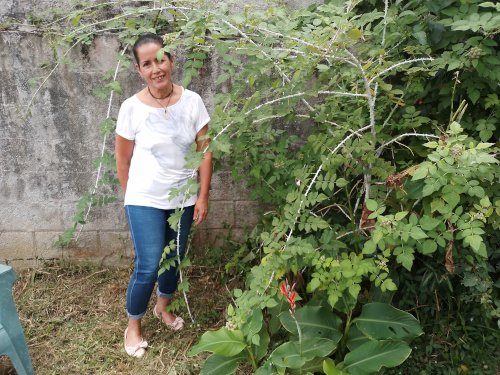
Ciertamente, me sentía muy feliz porque habían nacido varias matas de mora, sin embargo, no quedó más remedio que eliminar a la mayoría de ellas y dejar que crecieran solamente dos. Esto debido a que resultó ser una planta muy invasiva que se expande con gran rapidez, con la agravante de que todo sus tallos y ramas están llenos de espinas, lo que la convierte en una planta cuya cosecha es sumamente incómoda. Cada vez que me acerco a ella termino toda rasguñada por la gran cantidad de afiladas espinas que posee por todas partes, esto hace que no sea sencillo cultivarlas y pienso que quizás esta sea unas de las razones de su alto precio.
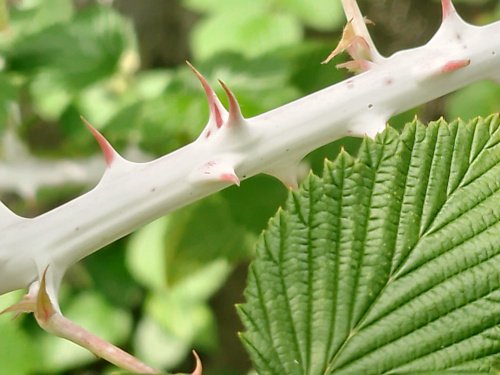
Por otro lado, en contrapeso por el hecho de ser una planta con las características antes señaladas, la mata de mora también conocida como zarzamora tiene la bondad de producir sus frutos de manera constante, todos los días obtengo su cosecha. Así que el tenerla en casa me permite satisfacer el consumo diario de mi familia, aunque sea en pequeñas cantidades. Creo que esto, es razón suficiente para conservarlas aunque sean incómodas.
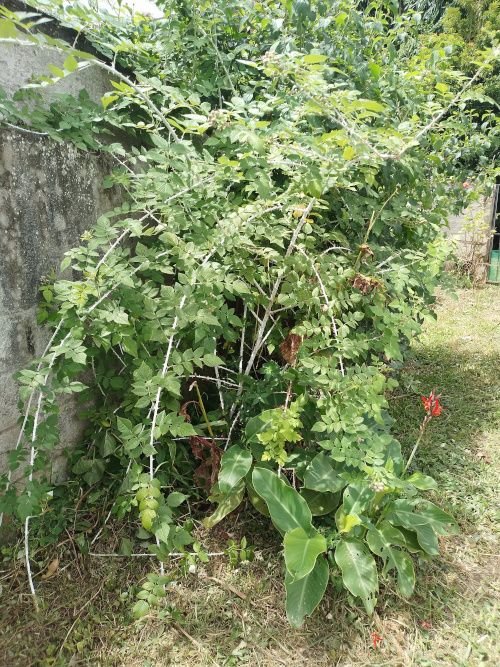
Las plantas de mora silvestre que han salido en mi casa, son de tipo arbusto, con espinosos tallos y ramas, tal como les dije anteriormente. Sus hojas son imparipinnadas de un intenso y hermoso color verde, las flores son pequeñas de color rosado pálido, constan de cinco pétalos cada una y brotan en forma de ramillete. Las frutas salen en racimos que contienen un promedio de entre ocho y doce moras cada uno.
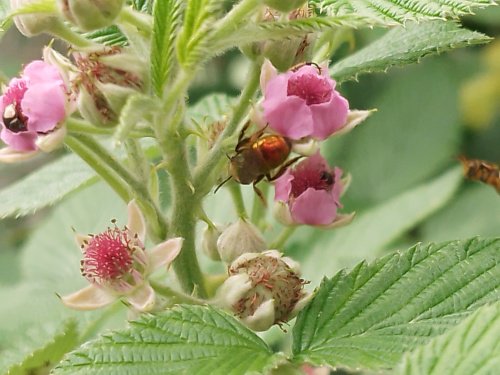
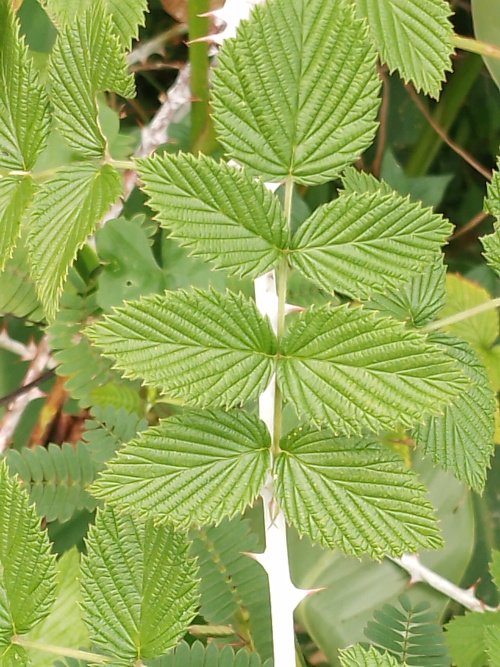
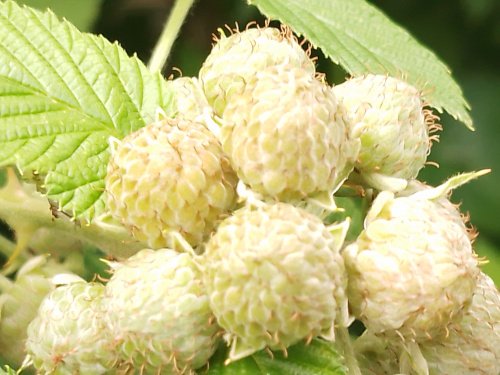
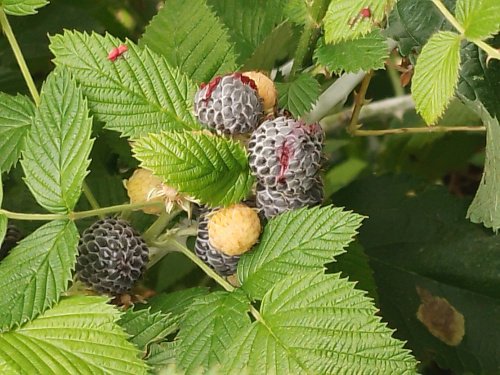
Me encanta el hecho de tener mis propias moras porque además de ser una fruta muy sabrosa, también es rica en hierro, potasio y vitaminas tales como la A, B y C, por lo cual siento la tranquilidad de poder introducir estos nutrientes de forma natural en la dieta diaria de mi familia.
Con la mora, además de poder consumirla directamente de la mata, también se pueden hacer jugos, jaleas, mermeladas y con sus hojas, preferiblemente disecadas, se pueden preparar ricas infusiones.
En mi caso particular, procuro que la fruta sea consumida directamente del árbol, es decir, es su forma natural. En caso de preparar algún postre, este sería de forma esporádica, pues no recomiendo el consumo regular de dulces.
Espero que este post sea de utilidad y motivador para que se animen a tener sus propias matas de mora, aunque estas sean espinosas, creo que vale la pena.
Todas las fotos son de mi propiedad y fueron tomadas con un celular Samsung A03.

English
In my garden spontaneously sprouted some bushes of blackberry, a matter that made me very happy, because for some time I had been thinking about how important it would be to harvest this species at home, since it is a very nutritious fruit and highly recommended to be consumed on a regular basis. The blackberry is one of those fruits that we would like to eat every day, but at least here in Venezuela it is difficult due to its high price compared to other fruits and the amount we would have to buy if we want to meet the nutritional needs of each of the members of our family group, especially when it comes to large families as in my case.

Certainly, I was very happy because several blackberry bushes had been born, however, I had no choice but to eliminate most of them and let only two grow. This is because it turned out to be a very invasive plant that expands very quickly, with the aggravating factor that all its stems and branches are full of thorns, which makes it a very uncomfortable plant to harvest. Every time I get close to it I end up all scratched by the large number of sharp thorns that it has everywhere, this makes it not easy to grow and I think that perhaps this is one of the reasons for its high price.

On the other hand, as a counterbalance to the fact of being a plant with the aforementioned characteristics, the blackberry bush has the goodness of producing its fruits constantly, every day I get its harvest. So having it at home allows me to satisfy the family's daily consumption, even in small quantities. I think this is reason enough to keep them even if they are uncomfortable.

Their leaves are imparipinnate of an intense and beautiful green color, the flowers are small pale pink, consist of five petals each and sprout in the form of a bouquet. The fruits come out in clusters containing an average of eight to twelve berries each.
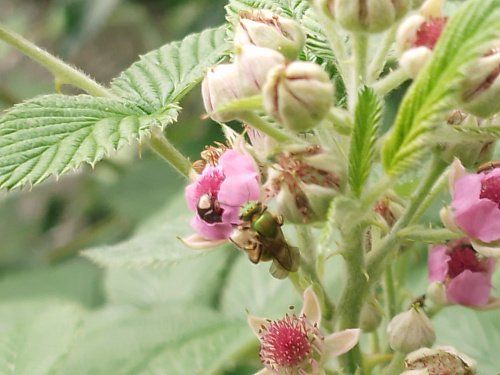



I love the fact that I have my own blackberries because besides being a very tasty fruit, it is also rich in iron, potassium and vitamins such as A, B and C, so I feel the peace of mind of being able to introduce these nutrients naturally into my family's daily diet.
With the blackberry, besides being able to consume it directly from the bush, you can also make juices, jellies, jams and with its leaves, preferably dried, you can prepare delicious infusions.
In my particular case, I try to eat the fruit directly from the bush, that is, in its natural form. In case of preparing a dessert, this would be sporadically, because I do not recommend regular consumption of sweets.
I hope this post will be useful and motivating to encourage you to have your own blackberry bushes, even if they are thorny, I think it is worth it.
Translated with www.DeepL.com/Translator (free version)
All photos are my property and were taken with a Samsung A03 cell phone.